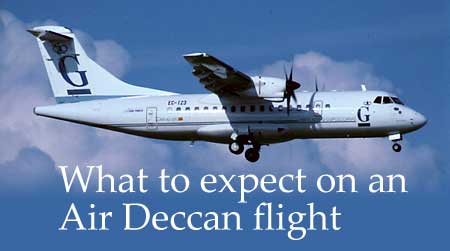Home > Business > Special
M D Riti in Bangalore |
September 08, 2003

So what's an Air Deccan flight like?
Well, for starters, it's cheap. It is fast. And it is safe.
You can also book your ticket, which is priced at just a little more than half the cost of a regular airline ticket, on the Internet.
There are no sweets or cotton earplugs when you take off.
Then there are efficient airhostesses who wheel around carts of food: only, you have to pay for the food.
This correspondent took a trip on an Air Deccan flight from Bangalore to Mangalore and back, on the airline's second day of operation, to experience first hand exactly what a traveler can expect when he or she travels on this low budget, no-frills airline.
"All that our passengers want from us is punctuality and safety, so we take extra care to ensure these two," says Monali, the airhostess on board.
Government regulations prescribe that an insurance of Rs 7.5 lakh (Rs 750,000) should be taken out on every passenger who travels on the airline. However, Air Deccan makes a combined single insurance of $200 million on every flight and all the passengers who travel on it.
On the day this correspondent took the round trip to Mangalore, which was to have lasted just two hours, the flight was almost five hours late because of some technical problem with the aircraft. Well. . .
However, the airline has promised two free one-way tickets to Mangalore on any days of a passenger's choice to every passenger who cancelled his/her ticket because of the delay.
Those who waited it out and actually took the flight were rewarded with the promise of a free air ticket to the same destination.
Otherwise, you lose 30 per cent of your fare if you cancel within the 24 hours before departure, 20 per cent if you cancel two days earlier and 10 per cent if you cancel three days earlier.
To book an e-ticket, you have to log into their Web site www.airdeccan.net. You are taken, step-by-step, through a six-stage booking procedure, which even helps you to decide what flight you want to take.
 Right now, there are only two flights a day, one each to Hubli and to Mangalore, both in the morning. Soon, Air Deccan Managing Director Captain G R Gopinath estimates that the airline will have operationalised 15 flights.
Right now, there are only two flights a day, one each to Hubli and to Mangalore, both in the morning. Soon, Air Deccan Managing Director Captain G R Gopinath estimates that the airline will have operationalised 15 flights.
Within a month, the number will go up to 24 flights. By November, Air Deccan will have 70 flights using six aircrafts, out of which one will be on permanent standby, preventing delays of the kind that happened on the day this correspondent traveled.
The other five will be stationed, one each, at Mumbai, Bangalore, Chennai, Hyderabad and Kochi. For quite some time more, Air Deccan will service only South India.
You can search for a suitable flight right on the Net, find out whether seats are available and get ticket prices (including taxes) online.
Then, you have the option of contacting a mobile phone number and blocking a ticket, or filling up a form online and buying the ticket, using your credit card. There is a transaction fee of Rs 25 on every ticket.
This correspondent was able to successfully book an e-ticket online and print it out. The e-ticket was produced at the airport counter, and was immediately exchanged for a boarding pass.
Theatre personality turned businessman Bimal Desai says he booked a ticket on the mobile number and when he came to the counter the next day, there was a ticket and a boarding pass waiting in his name.
As of now, tickets are all just computer printouts on ordinary white paper. Boarding passes are printed, but names and other details are filled in by hand.
"They should invest in basic printers and such machinery," argues planter Ramesh Rao, who was on his way back to his coffee estate.
But not all agree. "No, I think printed boarding cards and tickets are an unnecessary expense for an airline," says Ashwin Paul, commercial head of Mineral Enterprises Ltd.
You get a PNR number online, and the e-ticket. All you have to do is produce these two at the airport counter of the airline, as well as some proof of identity, like your credit card.
Air Deccan does not provide the luxury of a coach to transport you to your aircraft. You have to walk across the tarmac towards it.
Once you reach the aircraft, you are treated as well as a passenger on any other more expensive airline.
The passengers who are flying with Air Deccan right now are doing so for a variety of reasons.
"I cannot drive down any longer because my doctor has advised against it, so I am on this flight," says H S Shetty, managing director of Mysore Mercantile Co Ltd. "I just want to reach my destination quickly, I don't care about being served good food or drink."
"We wanted to encourage a local enterprise," say Ramesh Rao and his wife Shantha on why they took the flight.
"I wish they would issue us seat numbers : I feel uncomfortable to rush into an aircraft and grab seats," says Brigadier R N Trivedi, general manager of Mfar Constructions Pvt Ltd.
"We apologise sincerely for the delay, and promise not to repeat it," says airhostess Monali, making eye contact with individual passengers as she stood in the aisle, dressed in a long gray pencil skirt, a matching jacket, yellow collarless blouse inside and a yellow scarf with the Air Deccan logo printed all over it.
"Captain Gopinath has personally inspired all of us to feel for the company as if it were our own," she says, speaking to rediff.com.
"I have advised all my air hostesses not to talk down to passengers or patronise them," says Gopinath. "They are not to judge them by their clothes or their knowledge of English."
"In fact, I have advised them to speak to passengers in whatever regional languages the passengers are comfortable with, and have tried to pick multilingual airhostesses," he says.
"Our company has adopted a lean-and-mean approach to staffing," he continues. "We aim at maintaining a low aircraft-to-employee ratio. But we have some of the most experienced administrators, aircrew and engineers on our rolls."
Among the financial backers of Air Deccan are S N Ladhani, chairman of the Ladhani Group of Companies (India's largest Coke bottlers), former tennis ace Vijay Amritraj, and Gopinath himself.
The aircraft being used are all second-hand ATR-42-320 turbo-prop planes from France, bought directly from the company and taken care of by engineers from the French company based in India.
Gopinath says that they have been thoroughly checked out and found to be in perfect flying condition by the parent company.
ATR is a European joint venture between Alenia Aeronautica and EADS and has sold over 650 aircraft to more than 100 operators in 73 countries all around the world.
There are no sweets when you take off.
However, an airhostess does explain how oxygen masks, safety belts and emergency exits are to be used, in English and Hindi. The insides of the aircraft have all been redone by the parent company: it is very clean and the décor is a pleasant dark blue.
The flight itself is comfortable enough, although its understandably more bumpy than flying by a bigger aircraft is.
Refreshments on sale are basic: mineral water, cartons of juice, brownies and peanuts, et cetera. Nothing substantial or heavy.
"That's exactly how it is even on flights that last five or six hours in the United States, if you fly on low-priced airlines," said Christopher Gabriel, a physiotherapist from the US on his way to visit old friends in his hometown Mangalore.
However, passengers would be well advised to carry their own sandwiches, at least for the moment. The airline provided waiting passengers, most of whom had come in without breakfast, just two sandwiches and brownie over the five hours that they waited!
As of now, staff and systems seem a little disorganised, as every problem that the airline faces is new to it. Even the communication between the aircraft maintenance staff and the counter staff seemed disorganised.
However, the biggest plus point is that the company's managing director and senior management remain directly accessible on their mobile phones at all times, so that their staff and even passengers can talk to them about any problems they face.
The next three months are crucial for Air Deccan. Will they make good and survive? Or will they go the Vayudoot, NEPC, Pawan Hans and ModiLuft way?
"Those airlines were not really low-budget, they were just regional," says Gopinath. "Our major USP (unique selling proposition) is our extremely low airfares. I think the time is right for an airline such as ours. The others were too much ahead of their times."